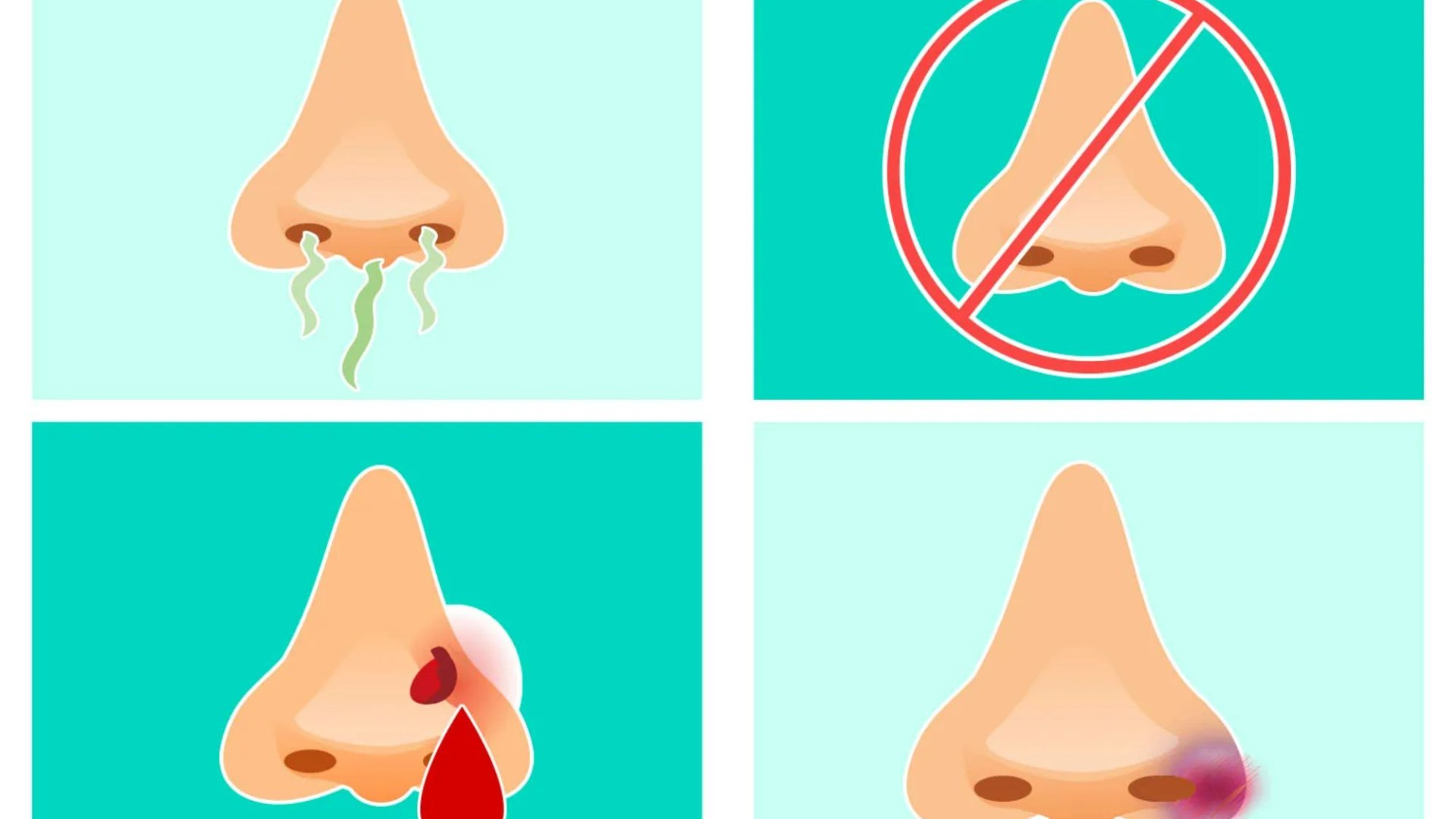IT may be gross to talk about snot, but it turns out you can learn a lot from your nose – and what seeps out of it.
From what your sense of smell can uncover about your brain to what the colour of your snot says about your lungs, your snout can reveal quite a lot.

6
Here, we delve into the signs of symptoms of eight serious conditions which you might first spot in or around your nostrils.
1. No smell
Find you can’t smell like you used to?
Diabetes can contribute to a compromised sense of smell.
Though it’s a subtle complication, the effects can be distressing.
The condition causes a person’s blood sugar level to become too high.
There are two types, with the main difference being that type 1 diabetes is a genetic condition, while type 2 is caused by lifestyle choices such as weight gain.
Both relate to how the body makes and uses insulin, a hormone that helps the body convert glucose (sugar) into energy.
Type 1 happens when the immune system mistakenly attacks and destroys insulin-producing cells in the pancreas.
This means the body makes little or no insulin.
Whereas with type 2, the body doesn’t use the insulin it produces properly.
Both can often go undetected and be hard to spot, as signs can be brushed off as something else.
A French study found that people with type 1 diabetes had a poorer sense of smell than those without diabetes.
They found the more severe someone’s diabetes complications, the greater the likelihood of an impaired sense of smell.
Other symptoms of diabetes include feeling very thirsty, peeing more, fatigue, weight loss and blurred vision.
When to worry
Diabetes, if badly managed, can cause nerve damage known as neuropathy – which is believed to be the cause of the loss of smell.
If you are experiencing a compromised sense of smell, talk to your doctor.
Damage from neuropathy may be permanent.
2. Nosebleeds
If you often suffer from nosebleeds, you could be suffering a genetic condition known as hereditary hemorrhagic telangiectasia (HHT).
People with HHT have some blood vessels which have not developed properly.
It can cause bleeding, both externally from the nose and internally, the NHS says.
When to worry
Frequent bleeding spells can lead to anaemia and other serious health issues like strokes.
If people bleed from inside the lungs, this can trigger low blood oxygen levels.
When it happens, it can cause seizures or headaches.
If you believe you have HHT, it’s important you see your GP.
Although there is no cure, there are effective treatments such as taking iron supplements and laser therapy to stop bleeding.
3. Smelling something that isn’t really there

6
You may smell something that isn’t there.
The aroma could be pleasant or nasty, or maybe you can only smell it from one nostril.
The disorder, called parosmia, happens when the smell receptors in the nose don’t detect odours and translate them to your brain in the way they should, the NHS says.
For example, if you sniff a banana, instead of something fruity and pleasant, your nose may pick up a foul odour like rotting flesh.
When to worry
Parosmia occurs when something is going wrong from inside the brain.
Sometimes it’s just the result of a virus, like Covid, and will pass within a few weeks.
But it can also be triggered by a head injury, drugs, seizures or a brain tumour.
It’s important to see a doctor to rule out anything serious.
Having a distorted sense of smell can be a health risk in itself.
You might be eating spoiled food, or miss things like smoke or a gas leak.
4. An itchy nose

6
If you notice the skin around the nose becoming numb, prickly or itchy you could have trigeminal trophic syndrome (TTS).
Although rare, TTS can be pretty destructive.
It happens when the the trigeminal nerve, which controls chewing but also gives sensation to the face gets damaged.
It can leave sufferers feeling the need to always scratch the skin around their nostrils, which can leave ulcers and sores.
When to worry
See your GP if you experience frequent or persistent facial pain, the NHS says.
Your doctor will try to identify the problem by asking about your symptoms and ruling out conditions that could be responsible for your pain.
However, diagnosing trigeminal neuralgia can be difficult and it can take a few years for a diagnosis to be confirmed.
5. A dark rash

6
A bluish or purple rash on the nose can be a sign of sarcoidosis – an autoimmune condition.
The condition causes small patches of swollen tissue, called granulomas, to develop in parts of the body.
In some cases, it is limited to just the skin – this is called cutaneous sarcoidosis.
The nose rash is a form of cutaneous sarcoidosis, called lupus pernio.
When to worry
In most people, sarcoidosis spreads to the lungs and lymph nodes, called systemic sarcoidosis.
It can also affect other parts of the body, including the brain, kidneys and heart – which can be fatal.
The cause of sarcoidosis is unknown, but some experts think it can be triggered by exposure to certain irritants, most commonly mould and pesticides.
There is some evidence to suggest certain people may be more genetically predisposed to develop the condition.
When this happens, the body’s immune system goes into overdrive and starts to attack itself.
There is currently no cure but symptoms can usually be managed with medicine, the NHS says.
6. Yellow snot

6
If you’ve spotted yellow-ish snot after blowing your nose, chances are you’re feeling a bit under the weather.
Pharmacist Rita Ghelani said if you notice your bogies or snot edging towards a yellow shade, it could be a sign your body is fighting an infection.
“The yellow colour is a result of your infection-fighting white blood cells being expelled with your mucus,” the expert previously told the Sun.
“You’re probably feeling rough and very blocked up.”
When to worry
Your body will usually clear up the infection within a few days.
But if you’re still feeling unwell after a week, your GP might be able to prescribe you some antibiotics.
7. Black bogies
Having black snot or bogies could be a sign of a serious fungal infection in the lungs, like aspergillosis.
Aspergillosis is a disease caused by aspergillus – a common mould found both indoors and outdoors.
According to the Centre for Disease Control, most people breathe in spores each day and don’t get sick.
But people with weakened immune systems or lung diseases are at a greater risk of developing health problems.
Other symptoms include a fever, chest pain, coughing up blood and shortness of breath.
However, in most cases having black boogers is down to where you live, and the air you breath in.
People who live polluted areas are more likely to see black stuff in their noses than those who live in the countryside.
When to worry
A fungal infection in your respiratory system is very serious, and requires urgent medical care.
It can cause long-term damage to the lungs.
Your doctor can diagnose your infection and treat it with anti-fungal medication, or refer you to a hospital.
8. A red nose

6
If your schnozzle seems to be permanently red, you could have rosacea.
The long-term skin condition causes redness and burning on the face, the NHS says.
When to worry
Over time, especially in men, rosacea can thicken and redden the skin on the nose, leading to a condition known as rhinophyma, the British Association of Dermatologists says.
In serious cases, it can change the shape of your nose and even make it harder to breathe.
Unfortunately, there is no cure for this skin condition, which can cause low self-esteem in those who have it.
The 3 things your teeth can tell you about your health
BEYOND cleaning your teeth morning and night, how much do you actually look at your teeth?
Your gnashers can actually tell you a fair amount about what’s going on with the rest of your body, if you know the signs to look for.
According to Nyree Whitley, chief clinical officer at mydentist, it might be time to peer into your mouth a little more closely.
From the early warning signs of tooth decay to a hint that you might be pregnant, Nyree told Sun Health seven things your teeth are telling you about your health.
1. Sensitive teeth
If your teeth are feeling sensitive, it’s definitely worth speaking to your dentist, Nyree said.
This is especially important if the feeling is persistent or it doesn’t seem to triggered by one specific food or drink.
Your teeth sensitivity could be down to a range of factors, but it could be a sign of gum disease, the dentist warned.
“If this is the case, you may also be experiencing bad breath or a bad taste that doesn’t seem to shift, red or swollen gums, bleeding gums, pain when chewing, or any change in the way that your teeth fit together when you bite,” Nyree said.
Unfortunately, gum disease – also known as periodontitis – can’t be cured, but it can be managed with proper care and maintenance.
Nyree suggested you get regular dental cleanings with your local hygienist to keep on top of it.
2. Flat teeth
Ever peered into your mouth and thought that your teeth look curiously… flat?
It could be a by-product of dealing with high stress levels or anxiety, according to Nyree.
You’re more likely to grind your teeth in these situations and you might not even be aware of it, the dentist said, as it usually happens while you’re sleeping or you’re in deep concentration.
If you’re also getting headaches and an achy jaw, chances are you’re grinding away at your pearly whites without realising.
This painful habit can be treated with mouthguards.
In some instances, your dentist might even recommend you get Botox injections to relax the jaw and break the cycle of grinding your teeth.
3. White spots on your teeth
If you notice little white spots on your teeth, there’s no need to panic straight away as they’re not necessarily harmful.
But Nyree said they may be an early warning sign of tooth decay.
“If you notice white spots on your teeth then make sure you speak to your dentist to establish why they may be occurring, just to be on the safe side,” she advised.
Aside from decay, the white patches could be caused by fluorosis – an overexposure of fluoride to the teeth – or congenital conditions, Nyree added.
5. Round growths on your gums
t’s probably pretty alarming to see round, red growths popping up on your gums.
But these strange-looking knobs – and gums that bleed more easily than normal – might actually be the harbinger of good news, according to Nyree, as they could be an early sign of pregnancy.
These symptoms are usually down to hormonal changes, so they could also indicate you’re going through the menopause.
Fluctuating hormone levels common during pregnancy and menopause can make you more vulnerable to gingivitis, a common gum infection, Nyree explained.
“It’s perfectly treatable if found early, but if it is left untreated, then gingivitis can lead to periodontal disease, which can cause further complications such as tooth loss,” she went on.
Nyree advised you speak to your dentist if you ever notice changes to your gums.




